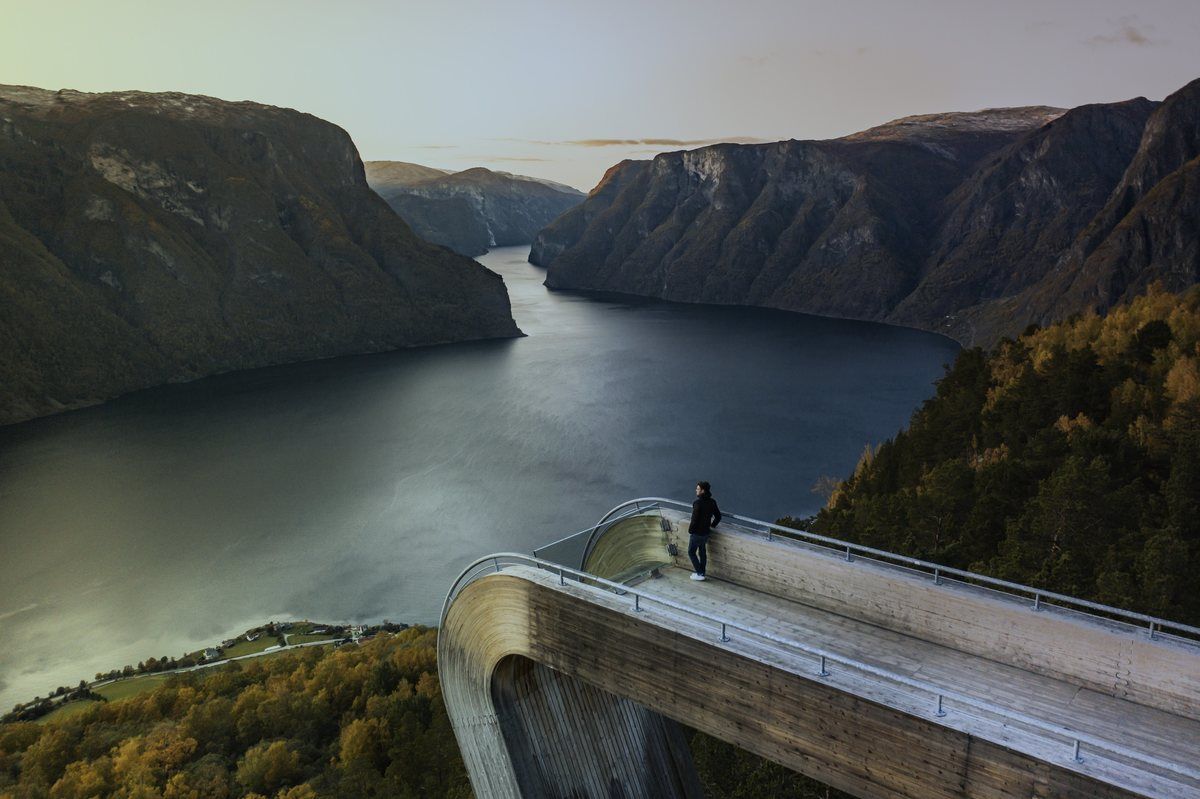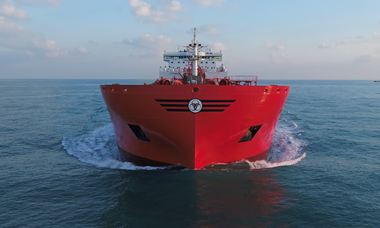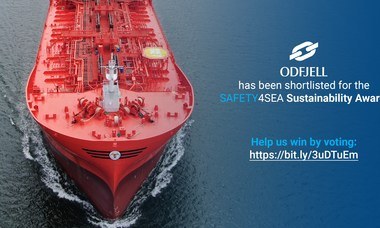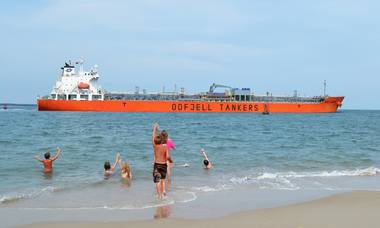The below was first published in Tank Storage Magazine ahead of StockExpo 2022. Written by CSO Øistein Jensen.
The challenge is obvious. Sustainability is about meeting our current needs without compromising the ability of future generations to meet their needs. But already in July 2022, we mark ‘Earth Overshoot Day’, the date when humanity’s demand for ecological resources exceeds what the planet can regenerate in that year.
Climate change is undoubtedly one of the biggest challenges of our times. Global warming is caused by increased concentrations of greenhouse gases (GHG) in the atmosphere, mainly from human activities, such as burning fossil fuels. To tackle climate change and its negative impacts, 197 countries adopted the Paris Agreement in December 2015. The agreement aims to substantially reduce global GHG emissions to limit the global temperature increase this century. We all have to do our part to achieve the aims of the Paris Agreement.
Sustainability for Odfjell is about having a long-term perspective on how we do business. It is about actions we take today that will make a difference in the future.
The best endorsement for this way of thinking is our 107-year history, and we plan to be here for the next 100 years as well. To do so, we need to act responsibly and think about our business’s long-term effects on people and the planet. In 2020, Odfjell set ambitious targets to reduce our environmental footprints. We aim to reduce our carbon intensity by 50% by 2030, compared to 2008 baseline, and to have a climate-neutral fleet from 2050. Both targets go beyond the International Maritime Organization’s (IMO) targets.
Massive industry – Massive potential
Although Odfjell is one of the world’s largest chemical tanker operators, we are still a very small part of the massive global shipping and terminals industry: The world fleet consists of about 90,000 ships that trade around the globe, night and day – among them Odfjell’s near 100 ships.
90% of world trade is carried by sea. This means that most of the products you and I use every day have been shipped across the oceans, many to and from a terminal. It also means that we are all extremely dependent on this industry, as there are no sustainable alternatives to keeping the global supply chains working.
Furthermore, world trade will continue to grow: According to the Organisation for Economic Co-operation and Development (OECD), the demand for ocean transport will nearly triple towards 2050, so the dependency on ships and terminals will also increase. Compared to other transportation methods, shipping is by far the most efficient and environmentally friendly.
However, due to the size of the industry and as ships burn fossil fuels, shipping is also responsible for about 2-3% of global greenhouse gas emissions. Per today, there are no commercially available alternatives for deep-sea shipping. We are a part of the problem, but also a part of the solution – and we have a responsibility to do what we can to make a positive difference.
Sustainable performance – Sustainable financing
Odfjell’s ships and terminals handle around 600 different liquids and chemicals. These chemicals are part of our modern life, vital to countless industries and products we use every day. Society, and our customers, trust us to handle these chemicals while adhering to the highest standards of safety and quality control.
Over the last few years, we have invested in new ships, digital tools, technical upgrades and retrofits of our existing fleet to improve energy and lower emissions.
We have improved data collection and quality to ensure that we make informed decisions that improve our operations.
So far, we have made significant advances. Today, our fleet is 46% more efficient than the 2008 IMO baseline, and the most energy-efficient fleet in our segment.
At our terminals, it is all in the details. Our storage tanks are sealed and pressurised. This reduces emissions more than regular atmospheric storage tanks for chemicals. The tanks are designed to reduce hazardous waste; the sloped design of the tank bottom limits residual product in tanks, making cleaning easier and better while reducing environmental impact.
Sustainable finance has become increasingly important for access to, and cost of, financing. We are convinced that this trend will continue. Given our ambitious targets and active role in sustainability initiatives, this is a welcome development that we encourage and wish to contribute to.
In 2021, we linked our climate targets to our financing by issuing the world’s first sustainability-linked bond in our industry, and all new mortgaged loans were sustainability-linked.
And the commitment goes beyond our own operations and financing: Many companies, including Odfjell, have set emission targets for the entirety of the business. This covers direct emissions, emissions from producing energy and emissions from the value chain; what we call scope 3 emissions. With this approach, direct emissions from our ships and terminals will be our customers’ scope 3 emissions.
It is essential that customers select efficient transport and storage providers, with low emissions, to achieve their goal of zero. We work with our suppliers to reduce our own scope 3 emissions and ensure that our environmental, social and corporate governance (ESG) expectancies are fulfilled, throughout the value chain.
In 2021, Odfjell was awarded an EcoVadis gold medal, which means that the quality of our sustainability management system is ranked in the top 5% of a total 75,000 rated companies.

Climate reports present clear evidence that climate change has already caused substantial damage and increasingly irreversible losses in terrestrial, freshwater, and coastal and open ocean marine ecosystems.
That is why Odfjell will focus on the impact our business has on nature and biodiversity, both in shipping and at our terminals. We can make a difference.
Øistein Jensen, Chief Sustainability Officer
A global spotlight on climate change
In July 2021, the European Commission launched the first tranche of measures that will support Europe’s climate policy framework and put the EU on track for a 55% reduction in carbon emissions by 2030, and net-zero emissions by 2050.
The interconnected proposals, named ‘Fit for 55’, cover the areas of climate, land use, energy, transport, and taxation to bring them in line with the targets agreed in the European Climate Law. Many of these new proposals will directly affect our business. The most significant one is the inclusion of shipping in the Emission Trading Scheme (ETS), a move Odfjell supports.
From 2023, shipping is planned to be included in the EU ETS. This will add to freight costs. We believe that putting a price on carbon will be a strong incentive to reduce emissions, and encourage charterers to select energy-efficient transport.
In August 2021, the Intergovernmental Panel on Climate Change (IPCC) presented its sixth assessment report, The Physical Science Basis. The report answers important questions on how emissions of greenhouse gases and other pollutants are altering our climate, how plants, soil, and the ocean store and release carbon, how the climate responds to human influence, and what we can expect from any increase in global warming.
The report is unequivocal in its assessment that human influence has warmed the atmosphere, ocean, and land. The UN Secretary-General said the report was a ‘code red for humanity.’ However, strong and sustained reductions in emissions of carbon dioxide (CO2), and other greenhouse gases, would limit climate change. This is an incentive for Odfjell’s ongoing efforts to reduce emissions and reach our climate targets.
Some months later, in November 2021, the parties of the Paris Agreement and UN Framework Convention on Climate Change met at COP26 in Glasgow. Leading up to, and during COP26, nations and organizations committed to new pledges and agreements to reduce emissions, and agreed on how best to achieve the goals of the Paris Agreement.
As a result, the prevailing consensus is that zero is the only meaningful target. Then, in February 2022, the IPCC presented the second part of its sixth report: Climate Change 2022: Impacts, Adaptation and Vulnerability.
The report assesses the effects of climate change on ecosystems, biodiversity, and human communities at global and regional levels. It presents clear evidence that climate change has already caused substantial damage and increasingly irreversible losses in terrestrial, freshwater, and coastal and open ocean marine ecosystems. That is why Odfjell will focus on the impact our business has on nature and biodiversity, both in shipping and at our terminals. We can make a difference.
Øistein Jensen gave a presentation on this topic at StocExpo 2022, held from May 23-25 2022 in Rotterdam, the Netherlands.



